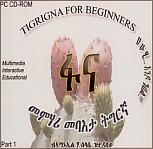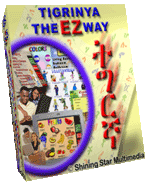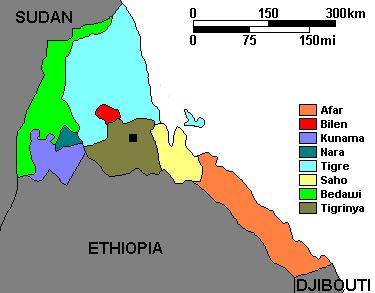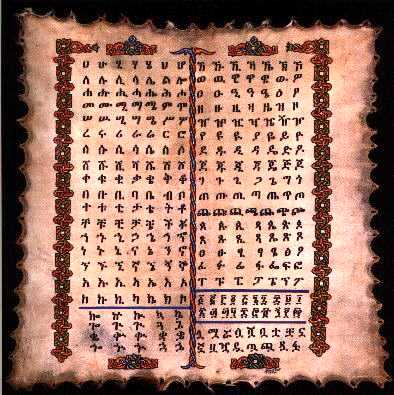Map of Eritrea
Location and geography
Eritrean history
Border conflict with Ethiopia
Political structure
Eritrean anthem
Economy & currency
Climate
People
Languages
Religion
Health care
Transport
Cuisine
News, links, books and more
Asmara (Asmera)
Agordat (Akordat)
Assab (Asseb)
Barentu
Dahlak islands
Dekemhare (Decemhare)
Ghinda (Ginda)
Keren (Cheren)
Massawa (Massauwa)
Mendefera (Adi Ugri)
Nakfa (Nacfa)
Semenawi Bahri (Filfil)
Tessenei
(Teseney)
Languages in Eritrea
There are nine languages in Eritrea. Tigrinya (50%) and Arabic are the working languages. The other languages are Tigre (40%), Afar (4%), Saho (3%), Bega (Beja), Bilen, Nara and Kunama. English and Italian are also widely understood.
There is no official language, though Tigrinya, Arabic and English predominate in commerce and national business. The use and development of all nine of Eritrea's languages are encouraged at the local level, and children attend primary school through the fifth grade in their mother tongue.
Toward the end of the nineteenth century, hundreds of thousands of Italian peasants settled in Eritrea. Some 70.000 remained in Eritrea at the end of the Italian colonial rule in 1941. Many, mainly older Eritreans therefore speak Italian.
Under the British administration, there were in effect two official languages, Tigrinya and Arabic.
During the years of the Ethiopian occupation, Amharic, the language of the ruling Ethiopian regime, was made the official language, and Eritrean languages were banned. But most Eritreans refused to speak Amharic. Instead, they continued to teach their native languages to their children.
English is now the language of instruction in secondary schools and in the University of Asmara and is fast becoming the foreign language of choice.
The policy of the Eritrean government is for all elementary education to be carried out in the language of the area.
Tigrinya
The Tigrinya characters Tigrinya, spoken by at least half the population, has its own script derived from the ancient language Gee ’ez, now only used in the Orthodox Church. The script has over 200 characters, each representing a different sound (see below). While our alphabet states a, b, c and so on, Tigrinya has its own character for ba, be, bi, bo and so on, which are mutants of the basic character. Tigrinya word endings vary according to the gender of the person you are speaking to. It is by any standards a very difficult language to learn.
If you know a few words of Tigrinya, you'll amaze and delight the Eritreans and quickly win friends.
| Tigrinya - cardinal numbers | ||
| 0 | Bado | |
| 1 | Hade | |
| 2 | Kilite | |
| 3 | Seleste | |
| 4 | Arba'ate | |
| 5 | Hamushte | |
| 6 | Shedushte | |
| 7 | Show'ate | |
| 8 | Shomonte | |
| 9 | Tishe'ate | |
| 10 | Aserte | |
| 11 | Aserte hade | |
| 12 | Aserte kilite | |
| 13 | Aserte seleste | |
| ..... | ..... | |
| 20 | Esra | |
| 21 | Esran haden | |
| 22 | Esran keleten | |
| ..... | ..... | |
| 30 | Selasa | |
| 31 | Selasan haden | |
| 32 | Selasan kiliten | |
| ..... | ..... | |
| 40 | Arba'a | |
| 41 | Arba'a haden | |
| 42 | Arba'a keleten | |
| ..... | ..... | |
| 50 | Hamsa | |
| 60 | Shisa | |
| 70 | Seb'a | |
| 80 | Semania | |
| 90 | Tese'a | |
| 100 | Mi'ti | |
| 200 | Kilite mi'ti | |
| 300 | Seleste mi'ti | |
| ..... | ||
| 1000 | Shih | |
| Tigrinya - days of the week | ||
| Monday | Senuy | |
| Tuesday | Selus | |
| Wednesday | Rebu 'a | |
| Thursday | Hamus | Friday | Arbi |
| Saturday | Kadam | |
| Sunday | Senbet | |
| Yesterday | Timali | |
| Tomorrow | Tsibah | |
| Tigrinya - months of the year | ||
| January | Turee | |
| February | Lekatit | |
| March | Megabit | |
| April | Miazia | May | Ghinbot |
| June | Sene | |
| July | Hamle | |
| August | Nehase | |
| September | Meskerem | October | Tekemti |
| November | Hedar | |
| December | Tahsas | |
| Tigrinya - useful words & phrases | ||
| Yes | U'weh | |
| No | Aykonen | |
| Fine, ok, beautiful | Tsebuk | |
| Hello | Selam | |
| Goodbey | Selamat | |
| Welcome | Merhaba | |
| Thank you | Yekeniyeley | |
| I am happy | Hagus iny | |
| I am sorry | Aytehazeley | |
| Where is . . . . | Abey alo . . . . | |
| Bus station | Maerefi autobus | |
| Bus stop | Autobus tetew tiblelu | |
| Train | Babur | |
| Railway station | Ferovia | |
| Left | Tsegam | |
| Right | Yeman | |
| Good day | Bruch me 'altee | |
| Good evening | Bruch me'shet | |
| Good night | Bruch leti | |
| I am tired | Anay degimay | |
| I am thirsty | Temiay | |
| Wait (a minute) | Hansab (or Tshana) | |
| Delicious | Te'um | |
| Tigrinya - foods and drinks | ||
| Breakfast | Kursee | |
| Lunch | Misah | |
| Supper | Derar | |
| Bread | Bani | Beef | Sga Kebtee |
| Cheese | Formajo | |
| Chicken | Derho | |
| Fish | Assa | |
| Butter | Tesmi | |
| Pepper | Berbere | |
| Beans | Baldengua (or Adagua) | |
| Vegetables | Hamlee | |
| Onions | Shigurtee | |
| Patato | Dinish | |
| Salad | Selatta | |
| hot | Woo 'uy | |
| Cold | Zehool | |
| Dry | Nikoots | |
| Delicious | Tu 'um | |
| Fresh | Haddish | |
| Spicy | Merir zibele | |
| Sweet | Muhkor | |
| One beer | Hanti biera | |
| Coffee | Boon | |
| Tea | Sha'hee | |
| Milk | Tsaba | |
| Water | Mai | |
| Mineral water | Mai gaz | |
| Coca Cola | Ko ka - Ko la | |
| Tigrinya - miscellaneous questions and respons | ||
| If speaking to a | male | female |
| How are you? | Kemey alogha | Kemey aloghi |
| Not bad | Dehan aloghu | |
| Very well thank you. And you? | Sennay, neshighum ke? | Sennay, neshighi ke? |
| What is your name? | Men shimka? | men shimki? |
| Where are you from? | Weddi ayenay kebabi ikha? | Gwai ayenay kebaqbi ikhi? |
| What is your address? | Adrashakha abey'yu? | Adrashakhi abey'yu? |
| What is your telephone number? | Qu'zri telephonekha kendey'yu? | Quzri shilkekhi kendey'yu? |
| When were you born? | Me'as tewelidka? | Me'as tewelidki? |
| What nationality are you? | Zyeginetka intay iyu | Zyeginetki intay iyu |
| Where were you born? | Abey tewelidka? | Abey tewelidki? |
| Where do you live? | Abey tinebir? | Abey tinebiri? |
| Where do you live? | Abey tigimet? | Abey tigimetti? |
| Do you speak English? | Ingliz fuzarebdo? | |
| I don't understand | Ayterede'anin | |
| Where are you from? | Kabey mezi'ka | Kabey mezi'ki |
| May I take your photograph? | Kese alekado? | |
| Do you have an ID? | Senedat alokado? | Senedat alokidi? |
| Do you understand? | Terrediika? | Terredi iki? |
| Excuse me! | Yigreta! | |
| Im sorry | Aytiha zeley | |
| Thank you | Yegeniyeley | |
| You're welcome | Genzebka | Genzebki |
| Good morning | Dehando hadirkum | |
| Good evening | Bruch mishet | |
| Good night | Luwam leyti | |
| Good bye! | Dehan kunu | |
| Good luck! | tsubuk e'dl! | |
| How do you do? | Kemey teghewun? | Kemey teghewuni? |
| Pleased to meat you | Tsubuk menelaye | |
| What is your father's name? | Abbogha men yibihal? | Abboghi men yibihal? |
| What is your mother's name? | Addegha men tibihal? | Addeghi men tibihal? |
| What is your son's name? | Weddikha men yibihal? | Weddikhi men yibihal? |
| What is your daughter's name? | Gwalka men tibihal? | Gwalki men tibihal? |
| Can I give you a hand? | Selam kiblekadoh? | Selam kiblekidoh? |
| Can I be of any help? | Kite hagagezdo? | |
| Are you hungry? | Temika aleka? | temiki aleki? |
| Are you thirsty? | tsemika aleka? | tsemiki aleki? |
| Where is the toilet? | Shiqaq abey iyu? | |
| Here it is! | Inehe! | |
| Do you need anything? | Zedliyeka neger allo diyu? | Zedliyeki neger allo diyu? |
| May I come in? | Ki'atudo? | |
| Come in | Ito | Itewi |
| Sit down | Kof bel! | Kof belli! |
| Tigrigna for beginners - by Amanuel Haileselassie - Helsinki Finland | ||
 |
 |
 |
|
Tigrigna for beginners contains Tigrinya elementary tutorials. The CD includes a variety of teaching material which would help for those who would like to learn the Tigrinya language, either from the beginner or to somebody with a very limited knowledge of the language. No previous knowledge is required since Tigrigna for beginners starts from the very basic like the alphabet, pronunciation etc. Additionally this CD-ROM was designed in a clever manner that teaches Tigrinya as well entertain at the same time. The CD is made with very rich multimedia techniques and user-friendly interfaces. Ordering information: http://www.enddana.com |
||
| Merhaba Tigrinia Language Tutorial CD-ROM |

|
|
Merhaba
Tutorial was created to serve as a starting point for those seeking
to learn Tigrinya but who have been hindered by the lack of good
instructional materials. The purpose of Merhaba tutorial is to
give the student the means to easily learn and practice what is
necessary to speak, read, and write what best can be called
conversational Tigrinya. While basic elements of grammar are
covered in this tutorial, this package is not intended to provide an
in-depth or academic study of Tigrinya. It will however help you
learn the basic alphabet and structure of the language, along with
hundreds of commonly used words, all in a self-paced and (we hope) fun
environment.
This program is prepared in such a way
that it can be used by all types of people who want to learn Tigrinya.
Some of the users could be:
|
| Tigrinya the EZ way |



|
|
Learning Tigrinya is both easy and fun with this multimedia program featuring point and
click native speaker's sound with the ability to record your own and compare to a native
speaker. This program contains over 2,000 Tigrinya phrases, words, and colorful images to make
learning Tigrinya fun and easy (or EZ).
Ordering information: http://www.africanlanguage.com |

